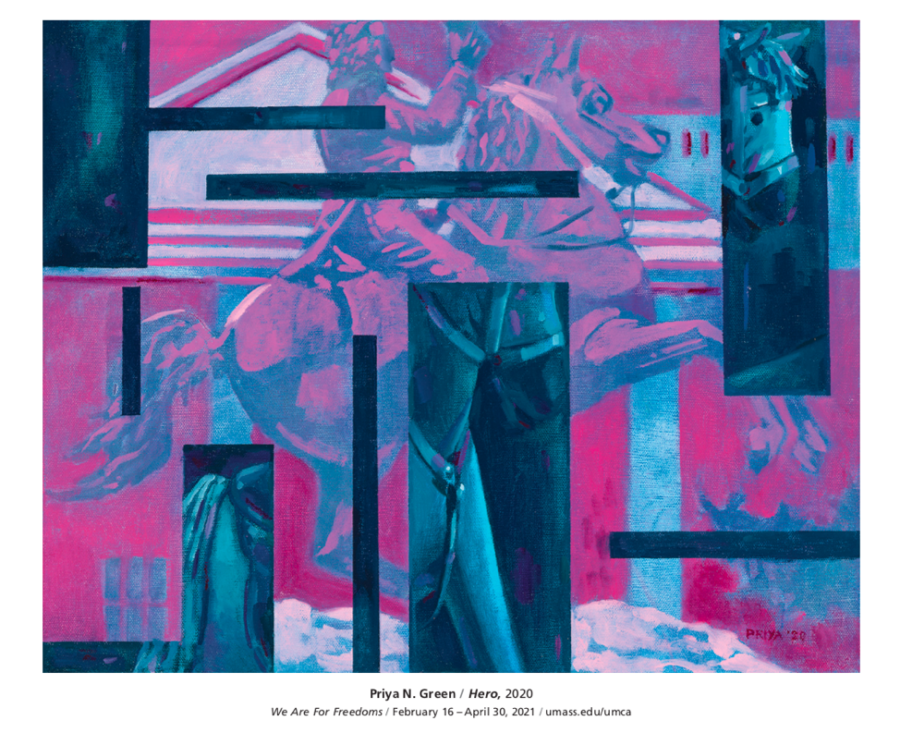The University Museum of Contemporary Art at the University of Massachusetts opened the “We Are For Freedoms” exhibition this spring, in partnership with the For Freedoms organization. The event was originally scheduled from March 17 to April 30 but is now being extended through the fall semester as well.
According to the exhibition website, For Freedoms is an “artist-led organization that models and increases creative civic engagement, discourse and direct action.”
The group “works with artists and organizations to center the voices of artists in public discourse, expand what participation in a democracy looks like and reshape conversations about politics.”
The exhibition can be viewed digitally online, but has in-person features available as well, details of which can be found on the UMass’ events website. Featuring numerous local artists from in and around the Amherst community, the project was broken down into three parts: The We Are For Freedoms exhibition itself, a “constellation wall” and an archives.
Amanda Herman, an educational curator at the Museum and the co-curator of this event, explained what she wished for when creating the project.
“I hope people will leave with a deeper understanding of what freedom means to different people and how contextual freedom is depending on who you are and where you live,” she said. “[I also hope they leave] with that kind of seed of hope or inspiration to either make work themselves or connect with the idea of each of us being a changemaker in the world and each of us having a role to play in making the world a better place.”
The project is free to view and has copies of the artists’ pieces in the exhibition hall itself so that people can take images of the work home with them. On average, the exhibition has around 10 visitors a day. They also had a virtual opening reception on March 4, which received around 170 viewers from all over the world.
According to Herman, the project was originally planned for fall 2020, around the time of the presidential election, as the artwork featured related topics like “voter registration and democracy and ideas around voting rights.”
However, due to the limited campus operations in the fall, the project was sidelined and the team had to modify their exhibition to accommodate new restrictions. They pushed the exhibit back to this spring.
Herman was strongly interested in the For Freedoms organization after she heard about it from a friend. She first hosted a Town Hall with them in 2018, where she invited different artists to come and talk about the “intersection between art, activism and social justice.”
The event was “well attended,” Herman said, and she noticed there was “so much interest in that topic,” that it got her excited about doing future work with the organization.
The exhibition itself features ten different artists who were invited to create art in response to the question, ‘What does freedom mean to you?’
Priya Nadkarni Green, an alumna of UMass fine arts graduate program, was one of the contributing artists. She explained how she answered the prompt through her piece, “Hero.”
“I was looking at the events of monument toppling,” she said. “I was thinking about how these monuments are getting toppled by people who have are feeling bound, like the history of this country is binding them, [that] they’re feeling that sense of being bound by it.”
“I also was thinking about the phrase, ‘if you don’t know your history [you] are doomed to repeat it,’” she continued. “To me, it was like that phrase and like these events of toppling the monuments seem to be at odds with one another because there’s this idea of erasing history, and if you erase your history, then it doesn’t exist or doesn’t have power.”
The Constellation Wall, one of the other parts of the exhibition, is a gallery of all the documentation the For Freedoms organization had. Herman explained, “There’s beautiful photographs documenting the billboards [that are the center of For Freedom’s initiatives], but they also did exhibitions and Town Hall conversations and they documented all of those.”
“It’s a basically like a collage,” she said.
The archives component is the “history connection” to the project. Herman contacted the University Libraries to assist her with it. The team wanted to find and include selections from historical archives of posters, newspapers, notices and photographs that have been used throughout history to encourage people to be civically engaged, Herman said. Some of the pieces in this segment come from the protest movements of the 1960s and 70s.
Carolyn Parker-Fairbain, a junior studying Afro-American Studies, is the creator and facilitator of the For Freedoms student organizing committee and an intern at the museum.
“I definitely think that the art in the exhibit, and with the For Freedoms organization, is becoming more central to the programming conversations that the committee is having,” they explained.
Parker-Fairbain added, “[We’re] really thinking about intentional programming that is linked to creation, so creating conversations between art and the communities that we’re serving…, thinking about creating links between other communities in in the valley and creating art, creating prompts, thinking about materials, lists and really getting inspired by the art that’s in the exhibit.”
Speaking about the piece, they said, “The exhibit is showing change, what changes are necessary, what changes have happened, where we can go and thinking about transformation.”
“I definitely think that the committee and the programming and the relationships that we’ve built are allowing us as individuals to transform and also allowing us to transform the UMCA and the larger campus community,” they added.
Mahidhar Sai Lakkavaram can be reached at [email protected]. Follow him on Twitter, @Mahidhar_sl.




















